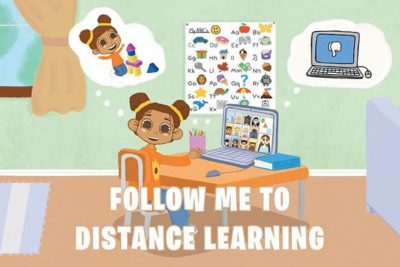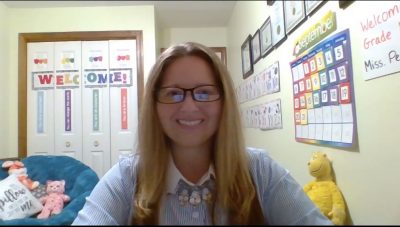
These past two years have posed a particular set of challenges for educators around the world. Not only were teachers forced to navigate a pandemic, but they also had to adapt quickly to a brand-new, online format of learning. Agnieszka Petlik ’16 6th Year, a kindergarten teacher in Simsbury, Connecticut, and graduate of the Neag School’s UConn Administrator Preparation Program (UCAPP), knows this transition all too well.
“When COVID hit, I had to make some choices because my parents live downstairs, and they’re [immuno] compromised,” says Petlik. “I was very nervous, just like the rest of the world, as to what is going on and what we are going to do.”
Personal Experience Inspires Book
Ever since her first job, Petlik, who emigrated with her parents from Poland when she was 7 years old, knew she wanted to work with kids.
“One of my first jobs was an after-school care provider at a school,” she says. “I would help all the kids with their homework and things, and I always loved that.”
After experiencing the hardships COVID-19 presented in her personal life as well as in her classroom, Petlik decided to transform these hardships into a story for children.
Follow Me to Distance Learning (Fulton, 2021) originally began as a poem. After writing the poem, Petlik realized pictures would be a great addition and asked her paraprofessional teacher if she could sketch some things to accompany the writing, and thus the book was born.

“I just really wanted to be able to have the kids see themselves in this character and know it’s OK to feel sad, and it’s OK to feel upset or to miss your friends, your hallways or your school,” she says.
In Follow Me to Distance Learning, the main character is forced to adapt to her new school routine. While she isn’t used to looking at a computer screen to receive an education, she uses her strength and perseverance to get through it with her teachers and peers. Petlik tells the story of how they got through it together, even though it was daunting and foreign in the beginning.
One of the last lines of the book reads: “Whenever things get hard, and you’re feeling blue, remember your teachers, friends, and family will see you through.”
Throughout the pandemic, Petlik recognized her students’ struggles and what they needed to hear to help them feel better. She says she stressed a sense of community in her classes and made sure her students were aware they were not alone, no matter what.
One dynamic she says she wanted to incorporate into her book was the diversity present in her classroom, which she highlighted through the illustrations.
“I was very intentional with my illustrations in the book, by having students of all backgrounds and abilities, because I wanted every student to relate to at least one of the characters in the story,” said Petlik in an interview with the Connecticut Education Association. “Equity and inclusion to me means that we meet every student’s needs based on their abilities and support them through not only academics, but also social emotional learning.”
Lifelong Learner
Petlik describes herself as a life-long learner. After completing her undergraduate degree at Central Connecticut State University, she completed her masters’ at the University of Saint Joseph and her 6th Year Diploma at the Neag School through UCAPP. She is now pursuing her doctorate back at CCSU.
“I really loved going to UConn,” Petlik says of her time in UCAPP at the Neag School. “It really opened up a lot of doors for me as far as what else I wanted to do and pursue.”
To this day, Petlik stays in touch with the friends and networks she built throughout her time as part of UCAPP’s West 27 Cohort. Her curiosity about school administration stemmed from her yearning to demonstrate her leadership skills.
“I always knew I wanted to be a leader in some component,” she says. “As I began to experience different things in different districts, I always thought that I should take my knowledge of what I know and be able to expand on it in my career, and be able to give back to whatever community as well.”
“I really loved going to UConn. It really opened up a lot of doors for me as far as what else I wanted to do and pursue.”
— Agnieszka Petlik ’16 6th Year
Petlik says she believes that, no matter what your role, it is always about how you support others and work together as a team. Being an educator during the pandemic only made this more apparent.
“One of the most important lessons I learned is to find that balance, and show kindness and grace, because you don’t know what other people are going through,” she says. “Finding that balance to be able to take care of yourself so that you can be ready to take on the challenges at work and the students.”
She explains how many teachers often bring their students home with them, on an emotional level, wondering what they can do to help them in their struggles. At the same time, she says she realizes it is just as essential that educators prioritize their self-care, to ensure they are showing up to work as the best possible version of themselves.
Along with teaching her students in person, Petlik is now responsible, as are so many educators, for preparing content for students who need to participate in distance learning.
“It’s a lot of extra work because now you’re balancing the regular classroom and the home classroom, but then you’re also finding more things that you have to plan, since you have to make sure that they have access to reading books, videos, and activities,” she says.
Petlik’s school administrators continuously remind staff members of the unusual nature of this time period to help them get through it.
“One of the things my administrator said is that our bodies are not built to be in this constant state of distress because we’re always either worried about COVID or whether we need to do something or change something,” she says
“While being there for one’s students is imperative,” she says, “it’s also necessary for teachers and staff to take care of themselves and their well-being.”
 Facebook
Facebook
 Twitter
Twitter
 LinkedIn
LinkedIn
